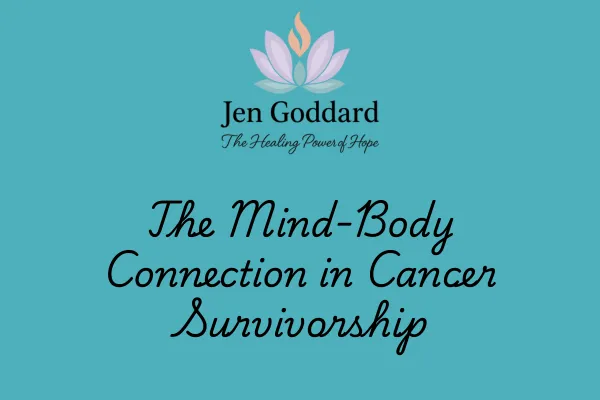Our Latest Articles

The Mind-Body Connection in Cancer Survivorship
Technically, I'm still a "cancer patient." Though testing shows I am now cancer-free, I still have one more infusion of immunotherapy scheduled next week.
But ... I am already a Cancer Survivor.

What is Cancer Survivorship?
Cancer Survivorship is about living with cancer, from diagnosis through the rest of your life. Survivorship theory acknowledges that your life is forever changed now by the diagnosis, treatment and living through and with cancer. There will always be a "new normal" along this journey.
It's important to acknowledge and not hide from this reality. It's oh-so-tempting to tell yourself it's over and you can "go back to living" ... recapture your old life as if this were just some unpleasant wrong turn along your journey.
But that is not reality.
Anyone who has been diagnosed with cancer has the opportunity to learn to live differently, with the likely benefit of not only aiding in their own recovery, but of improving their quality of life and perhaps even prolonging life beyond the "five-year-survival rate."
The Mind-Body Connection in Cancer Survivorship
In my survivorship research, I see a fundamental theme that goes beyond proper diet, regular exercise and other "healthy habits" that we all know we should be following.
It's the mind-body connection. Understanding how our mental attitudes and feelings can sabotage or enhance our health, recovery, and ultimately survivorship.
In his book, AntiCancer, Dr. David Servan-Schreiber writes,
"We must pay close attention to the mind-body connection, especially the negative impact of prolonged feelings of helplessness and despair. When left unattended, these feelings -- not the stresses of life themselves -- contribute to the inflammatory process that can help cancer grow."
This isn't just a feel-good theory.
Feelings of Helplessness Can Increase Mortality
In fact, one study out of Finland showed a high correlation between intense feelings of helplessness and increased mortality from all causes, but especially cancer.
Initially healthy participants were asked to answer two questions as true or false, as these feelings applied to them:
1. I feel that it is impossible to reach the goals I would like to strive for.
2. The future seems to me to be hopeless, and I can't believe that things are going to change for the better.
Six years later and all other factors being equal, those who rated both questions as "true" for them had a mortality rate three times higher than those had rated both questions as "false," or not applicable to them. They also developed 160% MORE FATAL CANCERS.
Acknowledging the reality that our lives are forever changed by. a cancer diagnosis does not mean we fall into hopelessness or despair. Rather, it gives us an opportunity to learn to live differently, and by so doing regain a sense of control and personal agency in our lives.
You have to fight, because if you don't, you let your opponent win. And if your opponent is Cancer, the result can be deadly.

